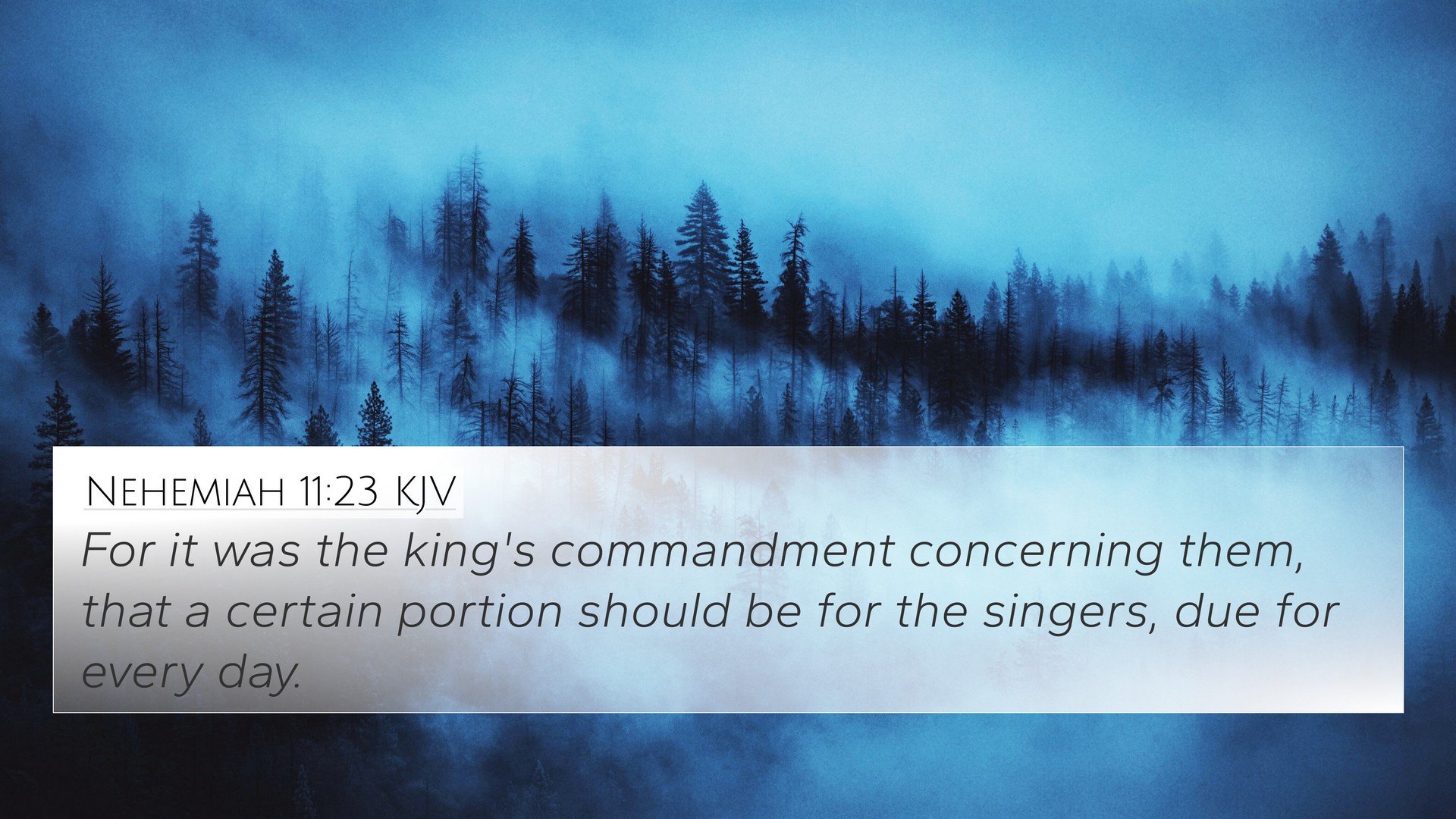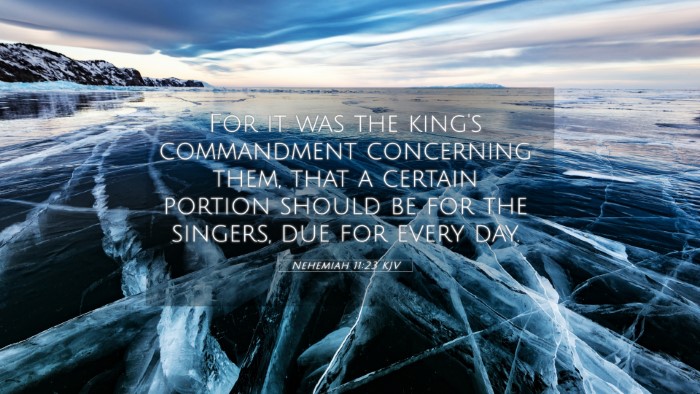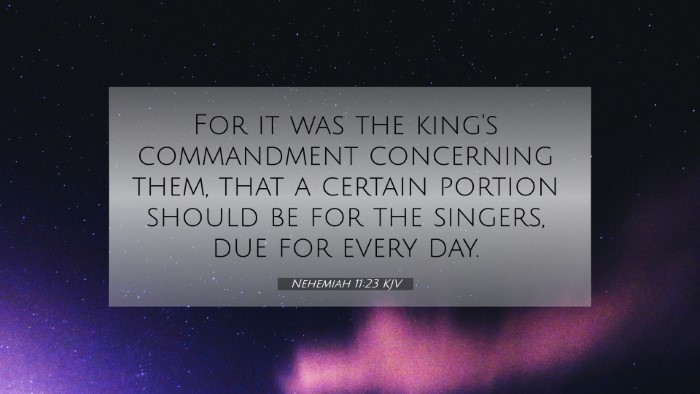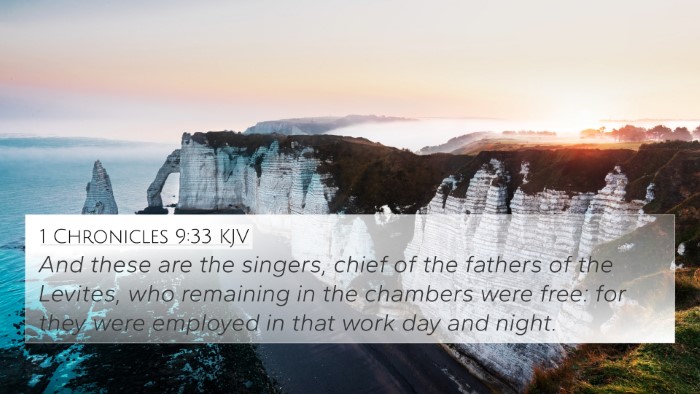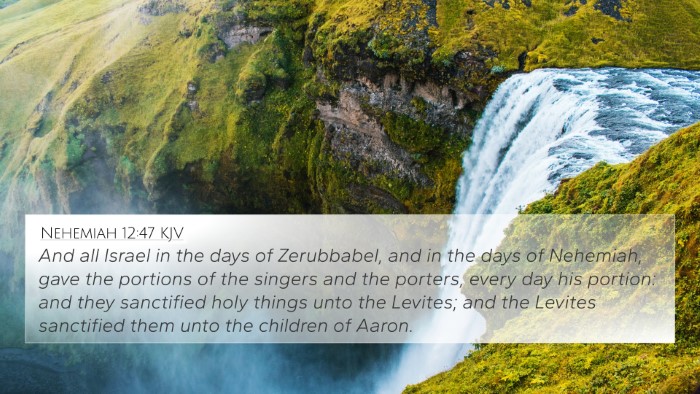Understanding Nehemiah 11:23
Nehemiah 11:23 states:
"For it was the king’s command concerning them that a certain portion should be for the singers, due for every day."
Verse Meaning and Interpretation
The context of Nehemiah 11:23 highlights the organization and responsibilities of the Levites and singers in the post-exilic community in Jerusalem. This verse underlines the essential support for the temple worship, emphasizing the role of the king's command in maintaining spiritual practices.
Insights from Commentaries
-
Matthew Henry:
Henry observes that Nehemiah was diligent in the work of reestablishing temple worship and emphasizes the importance of music in facilitating worship. He points out that the provision for singers reflects God’s desire for praise and worship in His house.
-
Albert Barnes:
Barnes notes that the king’s command demonstrates the governance required for sustaining worship. He emphasizes the necessity of regular support for those who lead in music and how such provisions are vital for maintaining reverence in the practices of worship.
-
Adam Clarke:
Clarke highlights the significance of the singers' roles as crucial in the liturgical life of the community. He connects the singers’ responsibilities to the broader theme of community participation in worship, indicating that their dedication is a reflection of collective devotion.
Cross-References and Connections
Nehemiah 11:23 showcases several thematic connections with other scriptures:
- 1 Chronicles 9:33: Details the role of singers and their duties in the temple.
- Psalm 68:25: Describes the singers leading worship, affirming their vital role in community praise.
- Ezra 3:10: Discusses the construction of the temple and the singing as part of the foundation-laying ceremony.
- 2 Chronicles 5:13: Highlights the significance of music in worship during the dedication of Solomon's Temple.
- Matthew 26:30: References Jesus and His disciples singing a hymn before going to the Mount of Olives, indicating continuity of the role of singers.
- Colossians 3:16: Encourages the congregation to sing psalms, hymns, and spiritual songs, demonstrating the importance of music in Christian community worship.
- Hebrews 2:12: Indicates the act of praising God as a communal expression, furthering the link between worshipers and singers.
Thematic Connections and Comparative Analysis
This verse connects to broader themes within the Scriptures, illustrating how worship is nurtured through dedicated roles:
- Vertical and Horizontal Worship: The relationship between God and His people is central; as singers lead praise, they encourage others to worship as well.
- The Role of Leadership: Similar to Nehemiah's leadership in organizing the community’s worship, other leaders such as David and Solomon took significant steps to establish worship protocols.
- God's Sustaining Provision: The king's command emphasizes God's provision for worship—a theme seen in the provision of manna in Exodus and the sustenance of the Israelites in their journey.
Conclusion
Nehemiah 11:23 encapsulates the essence of community and spiritual dedication, highlighting how essential it is for the corporate body of believers to maintain an environment conducive to worship. By looking at this verse alongside its connections and cross-references, one can gain a deeper understanding of the integral role music and community participation play in the life of faith.
Resources for Further Study
For those interested in deeper exploration of cross-references, consider utilizing:
- Bible concordances to find related themes and verses.
- Cross-reference guides that detail connections between key Biblical texts.
- Bible reference resources that offer comprehensive insights into the relationships between verses.
- Tools for Bible cross-referencing that aid in identifying connections, aiding personal study and sermon preparation.
